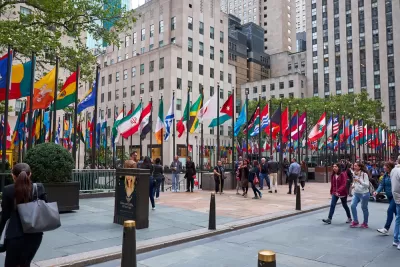New York City officials, including Mayor Bill de Blasio, are responding to a wave of terrorist attacks and other tragic events with a proposal to build protective bollards around the city.

"Hundreds of new protective barriers will be permanently installed in Times Square and other locations around New York in an effort to block vehicles from hitting pedestrians after deadly attacks last year on crowds," reports CBS News.
The city will spend $50 million on the project, a figure ridiculed by some on Twitter as an example of New York's tendency to over spend on infrastructure. With 1,500 the target number of bollards announced by Mayor Bill de Blasio, the project works out to over $33,000 a bollard. Following up on the official announcement, Vincent Barone offered more detail about the costs of the project on Twitter.
Clarification on costs of de Blasio’s bollard plan: the $50M will in fact pay for 1,500 bollards. Mayor’s spox said most will be metal bollards, but others might be geometric structures, etc. Costs are high because some bollards will require moving underground ifnra, he said.
— Vincent Barone (@vinbarone) January 2, 2018
Specific details about where the new bollards will be located were also scant. "City officials didn't specify what other locations will be fortified, beyond the bike path and Times Square, but said there would be barriers set up in all five boroughs," according to CBS News.
CBS News also recounts the chronology of tragic events leading to the project, including the November terrorist attack on the Hudson River Bikeway and the Bastille Day terror attack in Nice, France.
[Update] The Village Voice has published an article by Jake Offenhartz that expresses a healthy dose of skepticism about the efficacy and cost effectiveness of the program.
FULL STORY: New York City to install 1,500 protective barriers after vehicle attacks

Maui's Vacation Rental Debate Turns Ugly
Verbal attacks, misinformation campaigns and fistfights plague a high-stakes debate to convert thousands of vacation rentals into long-term housing.

Planetizen Federal Action Tracker
A weekly monitor of how Trump’s orders and actions are impacting planners and planning in America.

Chicago’s Ghost Rails
Just beneath the surface of the modern city lie the remnants of its expansive early 20th-century streetcar system.

Bend, Oregon Zoning Reforms Prioritize Small-Scale Housing
The city altered its zoning code to allow multi-family housing and eliminated parking mandates citywide.

Amtrak Cutting Jobs, Funding to High-Speed Rail
The agency plans to cut 10 percent of its workforce and has confirmed it will not fund new high-speed rail projects.

LA Denies Basic Services to Unhoused Residents
The city has repeatedly failed to respond to requests for trash pickup at encampment sites, and eliminated a program that provided mobile showers and toilets.
Urban Design for Planners 1: Software Tools
This six-course series explores essential urban design concepts using open source software and equips planners with the tools they need to participate fully in the urban design process.
Planning for Universal Design
Learn the tools for implementing Universal Design in planning regulations.
planning NEXT
Appalachian Highlands Housing Partners
Mpact (founded as Rail~Volution)
City of Camden Redevelopment Agency
City of Astoria
City of Portland
City of Laramie




























